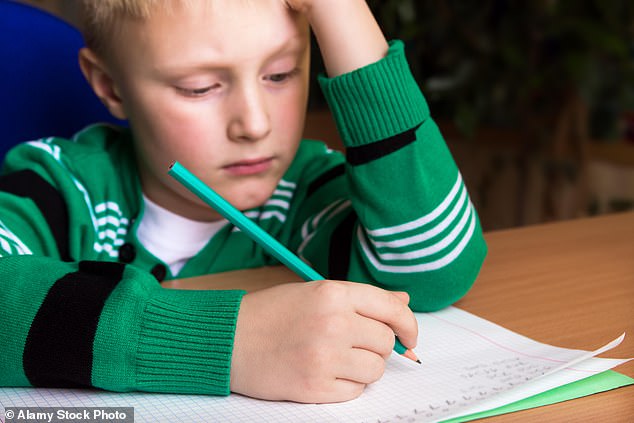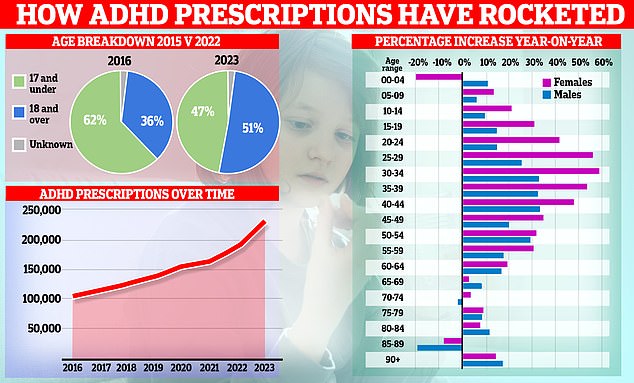I’m a psychologist – here’s how to tell if your child has ADHD or if they’re just a livewire
Awareness and diagnoses of ADHD are increasing.
But it can still be difficult for parents to know whether their child is among the five percent of those in Britain who have the conduct disorder.
Although ADHD is often stereotypically linked to ‘disruptive’ and ‘naughty’ behaviour, especially in young boys, it is now believed to be much more complex.
Dr. Seb Thompson, clinical psychologist at Cygnet Health Care in Sheffield, says people with the condition can suffer from just some or all of the telltale symptoms, such as difficulty concentrating, hyperactivity and impulsivity.
But no child has perfect concentration all the time and many children can have impulsive moments or periods when they are a little hyperactive.
Here Dr. shares. Thompson how to know if a child is actually showing signs of ADHD.

While ADHD is often stereotypically associated with ‘disruptive’ and ‘naughty’ behaviour, especially in young boys, it is now believed to be much more complex.

Fascinating graphs show how the number of prescriptions for ADHD medication in England has increased over time, with the patient demographic shifting from children to adults, with young women in particular now driving the increase.
ADHD doesn’t always look the same
There are some common patterns that emerge with ADHD, such as being easily distracted, having difficulty listening, and excessive talking.
However, it can also affect individuals very differently.
So if another child has similar behavioral characteristics to yours and has had a diagnosis, that doesn’t necessarily mean your child also has ADHD.
At the same time, two children can have very different behavioral characteristics, yet both have ADHD.
‘Each child with ADHD is likely to struggle with a unique set of problems,’ says Georgia Chronaki, senior lecturer in developmental neuroscience at the University of Central Lancashire.
“(For example) one child may have difficulty paying attention in class, another may have difficulty controlling their emotions.”
They find it very difficult to be quiet and still
It may be a stereotype, but uncontrollable fidgeting can be an indicator of ADHD.
Dr. Thompson explains: ‘The hyperactivity and impulsivity problems associated with ADHD may include inability to sit still without fidgeting, excessive restlessness, finding silence uncomfortable, difficulty completing tasks calmly, difficulty taking turns, saying or doing things impulsively. without thinking about the consequences, and a tendency not to consider the risks of behavior.’
Your child is often forgetful and loses things easily
Seeming forgetful or losing things is a telltale sign of ADHD, according to the NHS.
Frequently losing things, being easily distracted, appearing to daydream, having difficulty completing tasks and difficulty following instructions may be related to ADHD, says Dr. Thompson.
Still other experts dispute that daydreaming and mind wandering are signs of ADHD. They note that these are “natural phenomena” experienced by everyone as a way for the brain to process information.
They say it is only a hallmark of ADHD when it becomes excessive and begins to interfere with daily life.
You may notice that your child is having a hard time
If your child seems to be having trouble with things, this can be a big indicator.
“Imagine if you really want to pay attention to a conversation that’s happening, but your brain won’t let you,” says Dr. Thompson.
‘Imagine that you really want to concentrate on your homework, but your brain won’t let you.
“Imagine that you really want to watch a TV show, or sit and eat a meal, or sit and relax and your brain won’t allow you to do that.
‘The world can be a very frustrating place for young people with ADHD, especially if they don’t understand why their brains work the way they do.’
They appear gloomy or depressed
Some children with ADHD also suffer from anxiety and depression, the NHS says.
Dr. Thompson says this can occur in children who suffer from low self-esteem, as well as two mental health conditions.
“Young people who become frustrated by their difficulties may stop trying at school or lose interest in their hobbies because they cannot maintain the attention to participate in them,” he says.
Get advice
If any of these things are affecting your child’s well-being and making things seem difficult for them, or you are concerned that they may have ADHD, it may be worth seeking professional help .
Diagnoses are usually given by specialist ADHD assessment teams.
Referrals are usually made through schools or child and adolescent mental health services (CAMHS).
A GP cannot formally diagnose ADHD, but may suggest a ten-week ‘watchful waiting’ period during which parents monitor whether symptoms improve, remain the same or worsen.
If there is no improvement and a GP and parent believe that this is affecting the young person’s daily life, they can refer to a specialist.
